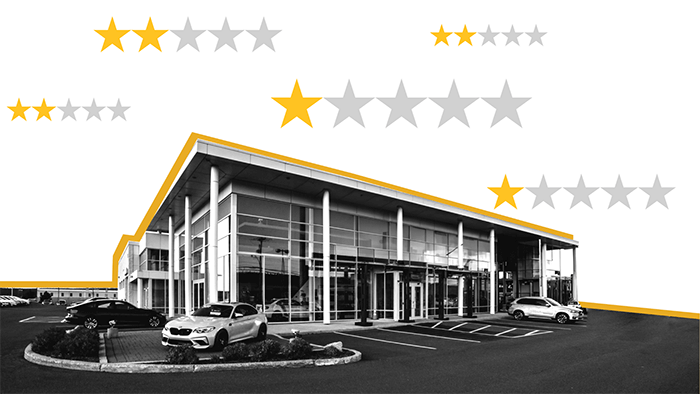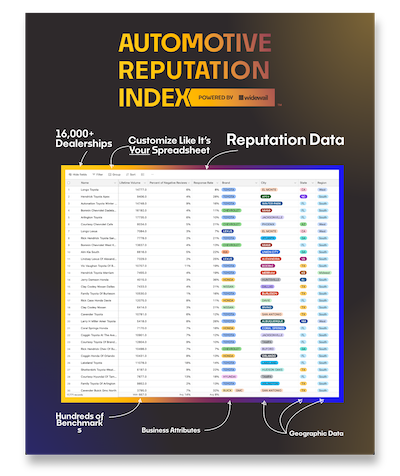Explore effective strategies for responding to common negative reviews within the auto world, turning challenges into opportunities for growth and improvement. Here are the right tools and strategies that can be used to your competitive advantage.

Buying and maintaining a car is everything from exciting to agonizing. While negative reviews are an unfortunate reality for every business, the high emotion associated with the auto industry makes them a fairly common occurrence for dealerships.
On average, 10% of a new car dealership's reviews in 2023 are negative reviews, meaning it's important to respond appropriately.
Whether received via a review or an automotive customer survey, tales of bad paint jobs to unexpected fees make their way into negative feedback and create difficulties in maintaining a positive online reputation. However, with the right tools and strategies, they can also serve as an opportunity for your dealership to grow and improve.
When you respond to negative reviews, you give your business a voice. You ensure your side of the story is told, while demonstrating to potential customers that you value the customer experience.
In this post, we’ll explore some of the most commonly received negative reviews for auto dealerships. With experience responding to over 1 million reviews, our response team can provide some expert insight on how to best handle them.
One common complaint found in negative auto reviews is that prices are too high. If your customers feel they are being overcharged, you’ll most likely hear about it in your reviews.
To effectively respond to these reviews, it’s best to be as transparent as possible. Instead of refuting the reviewer’s claims or getting defensive, address the issue of pricing directly.
Consider what factors may have influenced the perception of costliness. Maybe there was confusion during the negotiation process or the customer felt pressured into buying additional products/services. In your response, make it clear that you don’t run your business to take advantage of your customers, and offer to connect with the reviewer offline to address their concerns and help clarify the situation.
In the end, some customers just won’t like your prices, no matter how competitive they are. That’s why it’s crucial to respond and offer your side of the story.
One of the most distressing negative reviews a dealership can face is when reviewers claim they were sold a vehicle in poor condition – a "lemon." Handling these reviews requires empathy and swift action to address any complaints.
In your response, acknowledge and empathize with the reviewer’s frustration. Offer them a sincere apology for any inconvenience they experienced and stress your team’s dedication to customer safety and satisfaction.
Next, the best course of action is to offer the reviewer a way to get in touch with your team. Or you can call them directly. This helps avoid an escalation of the conflict online. It also demonstrates a willingness to help that goes a long way in mitigating negative impacts and rebuilding trust.

Negative reviews that highlight a poor sales experience, such as a customer claiming to experience bait-and-switch tactics or receive unexpected fees, can significantly impact a dealership's reputation.
To effectively handle these reviews, it's vital to emphasize your business values in your response without getting defensive. Your team wouldn’t intentionally mislead customers, so affirm that your sales process is founded on transparency and clear communication, but don’t entirely refute the claims made by the reviewer.
Next, invite the reviewer to reach out to discuss their situation with you directly. This shows that you value customer feedback. It also indicates to prospects that you are open to making changes to prevent any future miscommunications.
Bringing in a vehicle for service is always a chore. It’s expensive, time-consuming, and never convenient. Because of this, your team wants to make the service process go smoothly.
No matter how knowledgeable or professional your team is, the occasional mistake is bound to happen. It’s how you work to resolve things that matters.
For reviews that mention delays in service or missteps on behalf of your team, start by offering a sincere apology. People want to feel like their time and experiences are respected, and apologizing lays the groundwork for reaching a solution.
After apologizing, assure the reviewer that you will make note of their feedback. This helps show your willingness to make improvements and prevent future mistakes.
Lastly, if there’s further action needed, and you’d like to offer a solution, ask the reviewer to reach out directly. By suggesting a one-on-one conversation rather than continuing communication in a public thread, you take control of the situation and are in a better position to work things out.
*Keep in mind, when dealing with delicate situations such as vehicle damages, mistakes, etc., you should only present facts - don’t outwardly assume responsibility for a negative experience.
Claims of rude staff or poor treatment by your team can be tough to swallow. Your team actively does its best to deliver professional and courteous service, but things happen. People have off days and opinions clash, and when they do, you might get a negative review.
The best way to respond to this type of review is to keep your emotions out of it. While it can be hurtful to receive negative feedback about your staff, it’s important to stay measured in your approach.
First, apologize to the reviewer for how they were treated. Make it known you expect a higher level of service from your team, and assure the reviewer that their feedback will be addressed properly and with the right people.
Second, make it known that you would like to speak with the reviewer to address their concerns directly. Addressing the reviewer’s concerns via email or over the phone is your best shot at remedying a personal situation, and it ensures your online message stays respectful and professional.
While no two situations leading to a negative review are alike, there are a few general things to keep in mind when crafting an effective response. How to respond to negative reviews:
Overall, your goal in responding to reviews is to open up a line of communication with your unhappy customers. People don’t want to feel negatively about your business; they just want their voices heard.
While it's often difficult to respond to and acknowledge negative reviews, it demonstrates accountability and an awareness that builds trust for your business and works in your favor. It allows you to offer your perspective in an otherwise one-sided conversation. It also helps you identify concrete areas where your business can grow and improve.
Review management is the key to maintaining a positive online reputation for your dealership. To learn more about how to leverage reviews, see where your business ranks in the local market and gain a more comprehensive understanding of industry trends, check out Widewail's Automotive Reputation Index.

Automotive Reputation Index
Explore (It's Free)
Originally from Scarborough, Maine, I moved to Vermont after graduating from St. Lawrence University, where I received my BA in English and Spanish. I have always been interested in writing and communication, which is what initially drew me to the Review Response Specialist position at Widewail. In my spare time, I can be found reading, playing electric guitar, or strolling/biking around one of Burlington’s many scenic trails. I always welcome the opportunity to talk about my work, and invite anyone with questions or comments to reach out or connect with me on LinkedIn.
Bite-sized, to-the-point, trend-driven local marketing stories and tactics.
U3GM Blog Post Comments